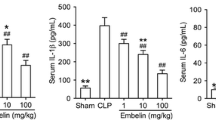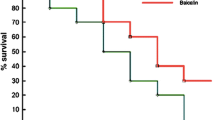Abstract
Objective
To investigate the effect of baicalein on polymicrobial sepsis-induced immune dysfunction and organ injury.
Methods
A sepsis model was induced in Sprague-Dawley rats via caecal ligation and puncture (CLP). Specific pathogen free rats were randomly divided into a sham group, CLP group and CLP + baicalein (Bai) group (n=16 each). Rats in the CLP + Bai group were intravenously injected with baicalein (20 mg/kg) at 1 and 10 h after CLP. Survival rate, bacterial load, and organ damage were assessed. Then each group was evaluated at 6, 12, and 24 h to investigate the effect of baicalein on immune cells and inflammatory cytokines in septic rats.
Results
Baicalein treatment significantly improved the survival of septic rats, decreased the bacterial burden, and moderated tissue damage (spleen, liver, and lung), as observed by haematoxylin and eosin staining. Septic rats treated with baicalein had strikingly increased proportions of CD3+CD4+ T cells and ratios of CD4+/CD8+ T cells in the peripheral blood and spleen (all P<0.05). Moreover, baicalein treatment decreased the apoptotic rate of whole white blood cells and spleen cells at 24 h after surgery (P<0.05). Baicalein significantly reduced the levels of tumor necrosis factor α and interleukin-6 (IL-6) and increased IL-10, and the expression levels of galectin 9 were also raised in the spleen (P<0.01).
Conclusion
Baicalein may be an effective immunomodulator that attenuates overwhelming inflammatory responses in severe abdominal sepsis.
Similar content being viewed by others
References
Singer M, Deutschman CS, Seymour CW, Shankar-Hari M, Annane D, Bauer M, et al. The third international consensus definitions for sepsis and septic shock (Sepsis-3). J Am Med Assoc 2016;315:801–810.
Sundararajan V, Maclsaac CM, Presneill JJ, Cade JF, Visvanathan K. Epidemiology of sepsis in Victoria, Australia. Crit Care Med 2005;33:71–80.
Vincent JL, Marshall JC, Namendys-Silva SA, Francois B, Martin-Loeches I, Lipman J, et al. Assessment of the worldwide burden of critical illness: the Intensive Care Over Nations (ICON) audit. Lancet Respir Med 2014;2:380–386.
Hotchkiss RS, Tinsley KW, Swanson PE, Schmieg RE Jr, Hui JJ, Chang KC, et al. Sepsis-induced apoptosis causes progressive profound depletion of B and CD4+ T lymphocytes in humans. J Immunol 2001;166:6952–6963.
Huang N, Ji FP, Zhang S, Li ZZ, Li J, Zhou R, et al. Spleen-associated effects on immunity in hepatitis b virus-related cirrhosis with portal hypertension. J Interferon Cytokine Res 2019;39:95–105.
Bolognese AC, Sharma A, Yang WL, Nicastro J, Coppa GF, Wang P. Cold-inducible RNA-binding protein activates splenic T cell during sepsis in a TLR4-dependent manner. Cell Mol Immunol 2018;15:38–47.
Dkhil MA, Al-Quraishy S, Mineim AEA. Ziziphus spina-christi leaf extract pretreatment inhibits liver and spleen injury in a mouse model of sepsis via anti-oxidant and anti-inflammatory effects. Inflammopharmacology 2018;26:779–791.
Gaire BP, Moon SK, Kim H. Scutellaria baicalensis in stroke management: nature’s blessing in traditional Eastern medicine. Chin J Integr Med 2014;20:712–720.
Dou J, Wang Z, Ma L, Peng B, Mao K, Li C, et al. Baicalein and baicalin inhibit colon cancer using two distinct fashions of apoptosis and senescence. Oncotarget 2018;9:20089–20102.
Shen YC, Chiou WF, Chou YC, Chen CF. Mechanisms in mediating the anti-inflammatory effects of baicalin and baicalein in human leukocytes. Eur J Pharmacol 2003;465:171–181.
Gao L, Li JQ, Zhou YZ, Huang XD, Qin XM, Du GH. Effects of baicalein on cortical proinflammatory cytokines and the intestinal microbiome in senescence accelerated mouse prone 8. Acs Chem Neurosci 2018;9:1714–1724.
Lee YM, Cheng PY, Chim LS, Kung CW, Ka SM, Chung MT, et al. Baicalein, an active component of Scutellaria baicalensis Georgi, improve scardiac contractile function in endotoxaemic rats via induction of hemeoxygenase-1 and suppression of inflammatory responses. J Ethnopharmacol 2011;135:179–185.
Wu YL, Lian LH, Ying W, Nan JX. Baicalein inhibits nuclear factor- κ B and apoptosis via c-FLIP and MAPK in D-GaIN/LPS-induced acute liver failure in murine modes. Chem Biol Interact 2010;188:526–534.
Liu AD, Wang WJ, Fang HS, Yang Y, Jiang XJ, Liu SP, et al. Baicalein protects against polymicrobial sepsis-induced liver injury via inhibition of inflammation and apoptosis in mice. Eur J Pharmacol 2015;748:45–53.
Xiang L, Hu YF, Wu JS, Wang L, Huang WG, Xu CS, et al. Semi-mechanism-based pharmacodynamic model for the anti-inflammatory effect of baicalein in LPS-stimulated RAW 264.7 macrophages. Front Pharmacol 2018;9:793.
Pu WL, Luo YY, Bai RY, Guo AW, Zhou K, Zhang YS, et al. Baicalein inhibits acinar-to-ductal metaplasia of pancreatic acinal cell AR42J via improving the inflammatory microenvironment. J Cell Physiol 2018;233:5747–5755.
Cheng PY, Lee YM, Wu YS, Chang TW, Jin JS, Yen MH. Protective effect of baicalein against endotoxic shock in rats in vivo and in vitro. Biochem Pharmacol 2007;73:793–804.
He X, Wei Z, Zhou E, Chen L, Kou J, Wang J, et al. Baicalein attenuates inflammatory responses by suppressing TLR4 mediated NF- κ B and MAPK signaling pathways in LPS-induced mastitis in mice. Int Immunopharmacol 2015;28:470–476.
Suda K, Kitagawa Y, Ozawa S, Saikawa Y, Ueda M, Ebina M, et al. Anti-high-mobility group box chromosomal protein 1 antibodies improve survival of rats with sepsis. World J Surg 2006;30:1755–1762.
Yang H, Ochani M, Li JH, Qiang XL, Tanovic M, Harris HE, et al. Reversing established sepsis with antagonists of endogenous high-mobility group box 1. P Natl Acad Sci USA 2004;101:296–301.
Tang LP, Xiao W, Li YF, Li HB, Wang ZZ, Yao XS, et al. Anti-inflammatory effects of Reduning Injection on lipopolysaccharide-induced acute lung injury of rats. Chin J Integr Med 2014;20:591–599.
Das P, Panda SK, Agarwal B, Behera S, Ali SM, Pulse ME, S. et al. Novel chitohexaose analog protects young and aged mice from CLP-induced polymicrobial sepsis. Sci Rep 2019;27;9:2904.
Yin HF, Huang LH, Ouyang T, Chen LY. Baicalein improves liver inflammation in diabetic db/db mice by regulating HMGB1/TLR4/NF-kappa B signaling pathway. Int Immunopharmacol 2018;55:55–62.
Hu XH, Miao PZ, Yu RH, Zheng HC. The immunoprotective activity of baicalin in mouse model of cecal ligation and puncture-induced sepsis. Cell Biochem Biophys 2015;71:543–547.
Zhang Y, Shan L, Hua YP, Wang D, Zeng HW, Liu RH, et al. Baicalein selectively induces apoptosis in activated lymphocytes and ameliorates concanavalin a-induced hepatitis in mice. Plos One 2013;8:e69592.
Ward PA, Bosmann M. A historical perspective on sepsis. Am J Pathol 2012;181:2–7.
Hasan Z, Palani K, Zhang S, Lepsenyi M, Hwaiz R, Rahman M, et al. Rho kinase regulates induction of T-cell immune dysfunction in abdominal sepsis. Infect Immun 2013;81:2499–2506.
Yasuda T, Takeyama Y, Ueda T, Takase K, Nishikawa J, Kuroda Y. Splenic atrophy in experimental severe acute pancreatitis. Pancreas 2002;4:365–372.
Hotchkiss RS, Osmon SB, Chang KC, Wagner TH, Coopersmith CM, Karl IE. Accelerated lymphocyte death in sepsis occurs by both the death receptor and mitochondrial pathways. J Immunol 2005;174:5110–5118.
Zhang Y, Zhou Y, Lou JS, Li JB, Bo LL, Zhu KM, et al. PD-L1 blockade improves survival in experimental sepsis by inhibiting lymphocyte apoptosis and reversing monocyte dysfunction. Crit Care 2010;14:R220.
Sahu BD, Kumar JM, Kuncha M, Borkar RM, Srinivas R, Siatla R. Baicalein alleviates doxorubicin-induced cardiotoxicity via suppression of myocardial oxidativestress and apoptosis in mice. Life Sci 2016;144:8–18.
Weber GF, Swirski FK. Immunopathogenesis of abdominal sepsis. Langenbecks Arch Surg 2014;399:1–9.
Chen LW, Lu Y, Zhao LJ, Hu LL, Qiu QM, Zhang ZL, et al. Curcumin attenuates sepsis-induced acute organ dysfunction by preventing inflammation and enhancing the suppressive function of Tregs. Int Immunopharmacol 2018;61:1–7.
Xu YJ, Li Y, Liu XH, Pan YC, Sun ZH. SPIONs enhances IL-10-producing macrophages to relieve sepsis via Cav1-Notch1/HES1-mediated autophagy. Int J Nanomed 2019; 23:6779–6797.
Kadowaki T, Morishita A, Niki T, Hara J, Sato M, Tani J, et al. Galectin-9 prolongs the survival of septic mice by expanding Tim-3-expressing natural killer T cells and PDCA-1+ CD11c+ macrophages. Crit Care 2013;17:R284.
Author information
Authors and Affiliations
Corresponding author
Additional information
Conflict of Interest
The authors declare no potential conflicts of interests.
Author Contributions
Chen HY, Zhang S, Yang J and Li ZF designed the research; Chen HY, Li J, Huang N, Sun J and Li BH performed the research; Chen HY wrote the first draft of the manuscript. All authors have read and approved the final version of the manuscript.
Supported by Program for Changjiang Scholars and Innovative Research Team in University, China (No. IRT1171)
Rights and permissions
About this article
Cite this article
Chen, Hy., Zhang, S., Li, J. et al. Baicalein Attenuates Severe Polymicrobial Sepsis via Alleviating Immune Dysfunction of T Lymphocytes and Inflammation. Chin. J. Integr. Med. 28, 711–718 (2022). https://doi.org/10.1007/s11655-022-3510-7
Accepted:
Published:
Issue Date:
DOI: https://doi.org/10.1007/s11655-022-3510-7




